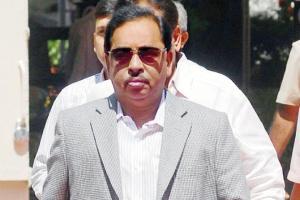What pushed Narayan Rane to leave his mentor Bal Thackeray and the party that made him who he is? Rane reveals this and more in new book, No Holds Barred

Narayan Rane. Pic/Sameer Sayyed Abedi
Operation Topple was instituted in 2001 by the Shiv Sena and BJP to bring down the then-Democratic Front government, headed by Congress, in Maharashtra. Narayan Rane who had previously been the CM of the state under a Sena-BJP alliance, in a book by him with Priyam Gandhi-Modi published by HarperCollins Publishers India, in 2002, says, the opportunity presented itself when a crucial ally to the government withdrew support over the reinstatement of NCP leader Sunil Tatkare. Yet, Rane says in the book, that party chief Bal Thackeray, whom he refers to as Saheb, let the opportunity slip, allowing the DF to retain the government and ending any chances he had of becoming CM again.
Edited excerpts from the book:
ADVERTISEMENT
The next morning, Saheb held a press conference at Rangasharda auditorium in Dadar, where Munde and I were also present. He minced no words in saying how unhappy he was that all government work had come to a standstill in Mantralaya and that all this petty politicking needed to stop. More importantly, he indicated to us privately that he didn't really support Operation Topple any longer in spite of his public stance, and that the onus of its success or failure would lie entirely on me. His attitude was clear when, the very next day, he told journalists that he did not feel suffocated without power and that there was no harm in taking a shot at toppling the DF government. He further directed the people at the press conference to forget the numbers game and drink some wine. This compounded my situation, as now not only were the defectors and potential defectors afraid of being disqualified and putting their political careers at risk, but the faith of those who were on the fence started to dwindle.
Subsequently, the NCP flew its legislators from Indore to Bangalore to join the Congress legislators. Detailed day-long strategy meetings took place with Vilasrao and Bhujbal. About 105 MLAs were flown back to Mumbai from Bangalore in a senior NCP leader's chartered plane and ferried to a five-star hotel in south Mumbai on the morning of the trust vote.
Also read: Box office report: Thackeray sees slow but steady rise in its first weekend
By the time we arrived at the assembly, the arithmetic was no longer working in our favour, and I put in a motion to withdraw the trust vote. Deshmukh, who was now on a high, with the tide having turned in his favour, insisted that we go ahead with the vote.
The PWP abstained from voting and Gujarathi had disqualified seven MLAs, bringing the strength of the House down to 276.
Needless to say, the DF government survived, barely scraping by.
I SPENT the days after the vote in silent contemplation. What had come as a complete shock to me was Saheb's abandonment of Operation Topple and, therefore, me. The more I thought about it, the more I felt that Uddhavji had much to do with the failure of the operation. My conclusion was that he wanted to avenge the insult that he had felt when he didn't find me at the club on his one and only visit, and had conspired with Munde — who, I was convinced, was the mole — and had got Fernandes to persuade Saheb to withdraw support to the operation.
This wasn't the first time that Fernandes had interfered heavily in matters of the state and certainly wasn't the first time that he had played broker between Saheb and Pawar Saheb. In 1982, when trade unionist Datta Samant had wreaked havoc in the textile industry in Mumbai, it was only after Fernandes intervened with a slew of 'meetings' that the two leaders joined hands to counter Samant and split the political benefits of the deal. That loyalty to Pawar Saheb had carried forward twenty years!
THE OTHER, more significant, realization that the operation brought upon me was that Saheb was human. He was easily swayed by his son and, in all my political wisdom, I knew that this was the beginning of Sena's doom. I could no longer thrive in a party of kitchen-table politics. Although it would take me a while to muster up the courage to confront my mentor for a final goodbye, my heart had stopped beating for the Sena. For me, it was all over.
SEVERAL SAINIKS, past and present, make this analogy even today: I was the muscle, Raj the spine and Balasaheb the heart of the Shiv Sena in its heyday. When I left in 2005, I took all of its muscle. When Raj, Balasaheb's nephew, left a few months later, he took the reliability and sturdiness of the party with him. And when Saheb passed away in 2012, the very heart of the Sena ceased to beat. What remains of the party today is a sorry shell which easily bends over without much persuasion.
Excerpted with permission from No Holds Barred by Narayan Rane with Priyam Gandhi-Modi, published by HarperCollins Publishers India
Catch up on all the latest Mumbai news, crime news, current affairs, and also a complete guide on Mumbai from food to things to do and events across the city here. Also download the new mid-day Android and iOS apps to get latest updates
 Subscribe today by clicking the link and stay updated with the latest news!" Click here!
Subscribe today by clicking the link and stay updated with the latest news!" Click here!







